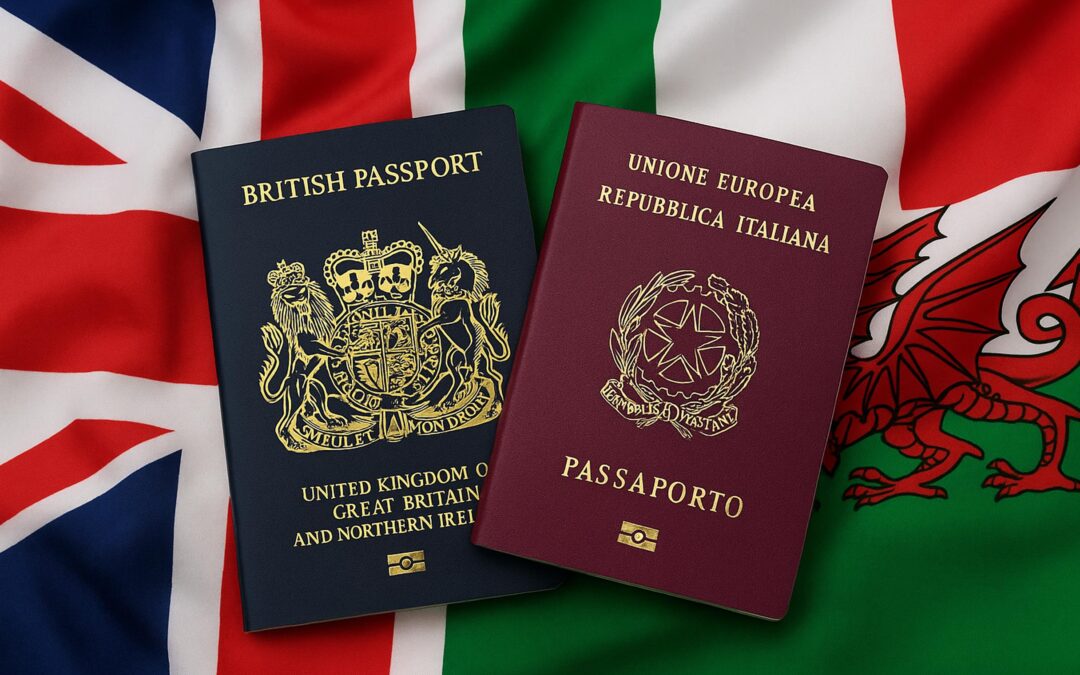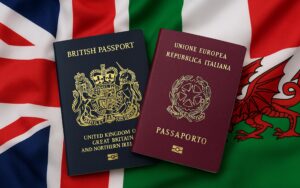On 23rd May 2025, Italy’s President, Sergio Mattarella, signed into law, Law No. 74/2025, finalising a dramatic overhaul of Italy’s citizenship rules and placing limits on citizenship by descent, also known as jure sanguinis.
Created by Antonio Tajani, Italy’s Deputy Prime Minister and Minister of Foreign Affairs and International Cooperation, the law started as an emergency decree Decreto-Legge n. 36/2025 on 28th March 2025 – bypassing the usual legislative process – and took effect retroactively at 23:59 on 27th March 2025, Rome time. This means it applies to all non-recognised people of Italian descent globally, not just those born after that date.
As the decree moved through parliamentary debate, it saw a number of amendments before becoming permanent law on 24th May 2025. Like the decree, the final law is retroactive and immediately changes how people of Italian descent worldwide can claim citizenship.
Quick links
How Italy has viewed citizenship over time?
Previous challenges for recognition
The new law and who will be recognised
The Welsh-Italian way of life, and what these changes mean for us
How Italy has viewed citizenship over time?
For over a century, Italy has seen its vast diaspora as an extension of its national community. These are the milestones in Italian citizenship laws:
- 1861: Italy unified in 1861, creating the modern Italian state and thus Italian citizens.
- 1865: The Civil Code of 1865 was adopted, which used paternal descent (jure sanguinis) as the main principle for passing down citizenship.
- 1912: Italy created Law No. 555, confirming citizenship passed automatically from Italian fathers to their children, even if born abroad. Dual citizenship was allowed only if your Italian citizenship was acquired by jure sanguinis. However, if you naturalised in another country, you lost Italian citizenship.
- 1948: The new Constitution declared equality for all citizens, regardless of gender; women could now pass on their Italian citizenship to their children.
- 1983: Italy’s Constitutional Court ruled that Italian women should no longer lose Italian citizenship automatically by marrying foreign men.
- 1992: Law No. 91 ended the automatic loss of Italian citizenship for those who acquired another nationality after August 1992. It also provided clearer paths for people to reacquire their Italian citizenship if they had lost it before that date.
- 28 March 2025: The government suddenly tightened the rules by emergency decree Decree-Law No. 36/2025, skipping the usual legislative debates. Italy now only recognised those with a parent or grandparent born in Italy.
- 23 May 2025: Parliament converted the decree, plus amendments, into permanent law, Law No. 74/2025. Amendments were added that allow some descendants of Italians to claim citizenship if they can demonstrate that they have a connection to Italy (as defined by the Italian government).
Previous challenges for recognition
Even before these recent changes, there were persistent hurdles faced by those seeking Italian citizenship recognition:
- Securing an appointment at your local Consulate General was the first challenge. These were in high demand and could take months or even years to secure.
- Document accuracy was crucial. You needed UK and Italian birth, marriage, and death certificates tracing your Italian ancestor. Even minor spelling errors or inconsistencies could delay or derail an application.
- Translation and apostilles were required for foreign documents—adding extra time and cost to the process.
- Rigid interpretation of the law by comuni and consulates, based on the government-issued circolare, meant there was no flexibility.
- Complex cases—such as those involving maternal lines or naturalisation issues—often ended up in the courts, burdening judges with deciding whether citizenship had been lost or preserved.
Ultimately, even though these processes were meant to simply recognise a citizenship right that had always existed, in practice, they created a bottleneck and could feel like the appointment itself was the moment you truly became Italian on paper.
As the load on the system grew globally, and more people challenged these processes, Italy clearly felt it was time to spell out – once and for all – exactly how citizenship by descent should work.
“Being an Italian citizen is a serious thing. It’s not a game to get a passport that allows you to go shopping in Miami.“
“Citizenship must reflect a real and emotional bond with Italy.“
Antonio Tajani, Italy’s Deputy Prime Minister and Minister of Foreign Affairs, in a press conference on 28th March 2025
The new law and who will be recognised
Under the new law of 23rd May 2025, a person is not entitled to Italian citizenship unless they fit into the following exceptions. Although these new exceptions outline who can be recognised under the new law, the Circolare 26185/2025 clarifies that if the line of transmission has been interrupted due to existing principles, the existence of these new conditions does not serve to remedy a prior interruption. This means that if the chain from grandparent to parent to child was broken at any point (for example someone acquired another citizenship before 1992), these new exceptions do not re-establish that lost citizenship line.
Citizenship by birth
| If a person… | That person is an Italian citizen… |
|---|---|
| Was born in Italy, to an Italian citizen parent. | From birth |
| Was born abroad to an exclusively Italian citizen parent*. | From birth |
| Was born abroad with an exclusively Italian citizen grandparent*. | From birth |
| Was born abroad to an Italian citizen parent** who resided in Italy as an Italian citizen*** for at least two consecutive years before the person was born. | From birth |
| Was born abroad to an Italian citizen parent** and is not entitled to any other citizenship. | From birth |
* the parent or grandparent must not hold or have held any other citizenships other than Italian citizenship.
** the parent can be an Italian citizen by birth, or by acquisition.
*** the parent must have been a recognised Italian citizen at the time they resided in Italy and they must have proof of residency for the two years.
Citizenship by acquisition
| If a person… | That person is an Italian citizen… |
|---|---|
| Was: 1. born abroad to an Italian citizen from birth parent* and 2. the parent made a declaration for the child to be Italian, and 3. the person resided in Italy for two years as a minor | By acquisition. |
| Was: 1. born abroad to an Italian citizen from birth parent* and 2. the parent made a declaration for the child to be Italian and 3. the parent registered the birth of the child within one year of the birth | By acquisition. |
| Was: 1. born abroad to a current or former Italian citizen from birth parent* and 2. was not registered by their parent within one year of birth and 3. the person then goes on to be a resident in Italy for two years as an adult and 4. obtains a certificate of language proficiency at B1 level or higher | By acquisition. Minor children can be included. |
| Was: 1. born abroad with a current or former Italian citizen from birth grandparent* and 2. was not registered by their parent within one year of birth and 3. the person goes on to be a resident in Italy for two years as an adult and 4. obtains a certificate of language proficiency at B1 level or higher | By acquisition. Minor children can be included. |
* the parent or grandparent must have been an Italian citizen from birth, and not by acquisition.
What about those who had already started the recognition process?
The new law also has timing provisions for those who had already started the recognition process:
| If a person… | That person… |
|---|---|
| Had already submitted an application by 27th March 2025, 23:59 (Rome time). | Will be assessed under the old rules. |
| Had a confirmed appointment communicated to them by 27th March 2025, 23:59 (Rome time), even if the appointment was scheduled for after that date. | Will be assessed under the old rules. |
| Has minor children (minor at 24th May 2025) and had submitted an application, or had a confirmed appointment by 27th March 2025, 23:59 (Rome time). | Has until 31st May 2026 to register their minor children. Those children will be Italian citizens by acquisition. |
For those who don’t meet these exceptions, citizenship is no longer automatically recognised.
What next?
If you still qualify then there is noting stopping you from booking an appointment at your local Consulate General and beginning the process to have your citizenship recognised.
That said, this new law is still very recent, and it’s likely that interpretations will change over the coming years as people challenge its scope and as the Italian courts clarify the finer details. As has been the case with every citizenship law in the past, further amendments and updates are always possible.
If you’re unsure about whether or how you might qualify now, we would first recommend you consult the Italian Consulate General website for the office that covers your area (Wales is covered by the Italian Consulate General in London). We suggest looking at the office dedicated to your area as often requirements differ between Consulate Generals.
Please remember that this is a period of significant upheaval for all Consulate Generals, and they are likely experiencing a surge in enquiries while also navigating this new legal territory. It’s important to note that generally, Italian Vice Consulates (such as that in Cardiff) do not handle citizenship enquiries or applications. This means that only the Consulate Generals have the authority and staff to assist in these matters. Thus we do not recommend that you contact an Italian Vice Consulate on these matters.
Another source of information are the many online forums and groups where people share their experiences with Italian dual citizenship. You can find these groups on Facebook and Reddit, for example, and their members include a mix of lay people and those with legal backgrounds, making them a helpful starting point for discussion with others who have shared experiences. Be sure to approach any advice in these forums with care, as each situation can be very different, and Italy’s rules can evolve quickly.
There is also the option of seeking legal advice from an Avvocato, though be mindful that fees will likely apply.
The Welsh-Italian way of life, and what these changes mean for us
Since 1973–1974 (with the beginnings of the European Union’s freedom of movement), Welsh Italians didn’t need Italian passports or residency permits to live and work in Italy. This freedom meant that many families never formally registered births, marriages, or claimed citizenship—even though they were Italian by blood. Over time, these unregistered events created gaps in the paperwork that became tricky to fix.
For many of us, these changes feel like a turning point. Many Welsh Italians may feel that we have never lost our connection to Italy. We have kept close friendships and family ties there, and many of us still have homes in Italy today. Despite the fact that for some of us our ancestors came to Britain over 100 years ago, our sense of belonging to Italy has remained strong. However, under the new law, many will no longer qualify for citizenship by birth or acquisition, even if we feel culturally Italian in every other way.
These changes bring a new chapter for our community – one that highlights how important it is to keep that connection alive through travel, language, and cultural ties.
Reference links for further reading
Law No. 74/2025 – Gazzetta Ufficiale: The exact wording of the as published on the Gazzetta Ufficiale.
Circolare 26185/2025: The guidance issued to the comune and Consulate General regarding how to apply to new law.
Consulate General of Italy in London – Citizenship Page: The London Consulate General’s guidance to the public regarding Italian citizenship.
Consulate General of Italy in London – Citizenship by Jure Sanguinis: The London Consulate General’s guidance to the public regarding Italian citizenship by descent.
Consulate of Italy in London – British citizens of Italian origin: The London Consulate General’s guidance to the public specifically regarding Italian citizenship by descent for British citizens.




